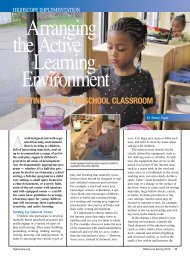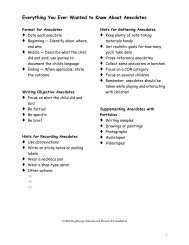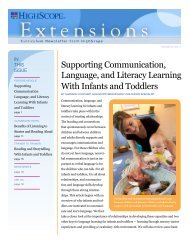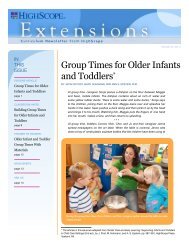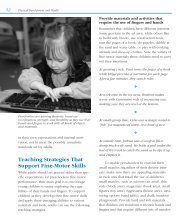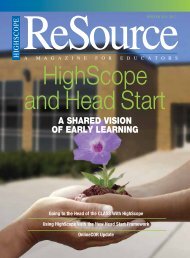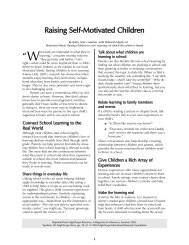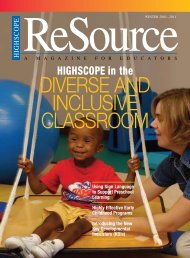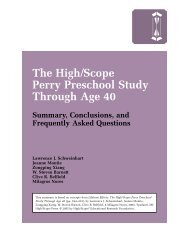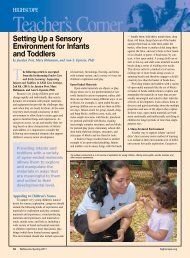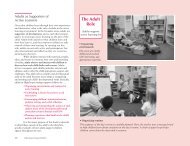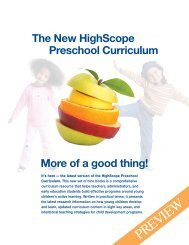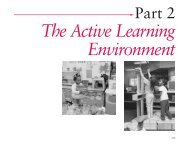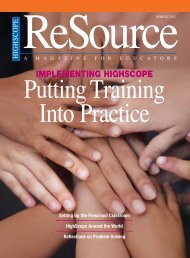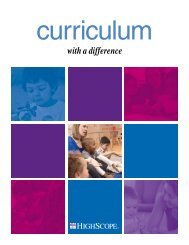Resource - High/scope In The Elementary Classroom
Resource - High/scope In The Elementary Classroom
Resource - High/scope In The Elementary Classroom
You also want an ePaper? Increase the reach of your titles
YUMPU automatically turns print PDFs into web optimized ePapers that Google loves.
REAL SCiENCE iN PRESCHooL<br />
and the types of play scenarios that develop<br />
in this learning area often involve<br />
children distinguishing and grouping<br />
materials, roles, and actions, as exemplified<br />
by the following (some of these<br />
scenarios refer to scenarios given in<br />
“observing,” above). Also note that as<br />
children elaborate on their play, they may<br />
bring materials over from other areas.<br />
<strong>The</strong> house area can<br />
be one of the best<br />
environments for<br />
children who are<br />
classifying, organizing,<br />
or sorting objects<br />
or information.<br />
<strong>The</strong> cake bakers say that their cake<br />
recipe calls only for “the pine cones<br />
and the yellow sponges — we don’t<br />
want any of the packing peanuts.”<br />
While Tommy and Maria are setting<br />
the table, they organize not only all<br />
the plates and bowls but also the<br />
silverware to make sure there is one<br />
piece for each place setting. When<br />
it’s time to clean up, they put the<br />
knives with the other knives, and<br />
the forks with the other forks; then<br />
they put all the plates together and<br />
all the bowls together.<br />
over in the veterinarian’s office,<br />
the vet’s assistant has to find all the<br />
tools the vet needs for an operation<br />
on the sick puppy, so she went over<br />
to the woodworking area and got<br />
the hand drill, some clamps, and<br />
a screwdriver.<br />
<strong>The</strong> mommies who are caring for<br />
their babies are sorting through<br />
the blankets to find the softest ones<br />
to wrap their babies in, because it<br />
is naptime.<br />
Experimenting<br />
As children continue and elaborate<br />
on their play scenarios, they try out<br />
solutions to problems and test their predictions<br />
(the following scenarios are a<br />
continuation of those given above):<br />
<strong>The</strong> cake bakers consulted their<br />
cookbooks about whether or not the<br />
cake needed some kind of liquid and<br />
then checked with José, the teacher.<br />
Children and adults can turn the house area into a doctor’s office and pretend to be doctors and patients.<br />
<strong>The</strong> Six Components<br />
of the Preschool<br />
Scientific Method<br />
Observing: Paying close attention to<br />
something to learn more about it<br />
Classifying: Grouping similar things<br />
together by identifying the relationships<br />
between things and the categories they<br />
belong to<br />
Experimenting: Testing an idea to see<br />
if it is true, or trying a solution to see if<br />
it works<br />
Predicting: Describing what you expect<br />
will happen<br />
Drawing conclusions: Fitting one’s<br />
observations into one’s existing system<br />
of knowledge and understanding<br />
Communicating ideas: Sharing one’s<br />
questions, observations, predictions, and<br />
conclusions with others<br />
Real<br />
Science<br />
in Preschool:<br />
Here, <strong>The</strong>re, and<br />
Everywhere<br />
Authentic, hands-on science<br />
learning takes place every day<br />
throughout the classroom as well as<br />
outdoors. You’ll learn to recognize<br />
and support the six behaviors that<br />
are part of the preschool scientific<br />
method and that you’ll see in all types<br />
of children’s play — behaviors that<br />
lay the groundwork for children’s<br />
later science learning in school.<br />
FW-P1366 $25.95<br />
www.high<strong>scope</strong>.org ReSource Fall/Winter 2008 21



